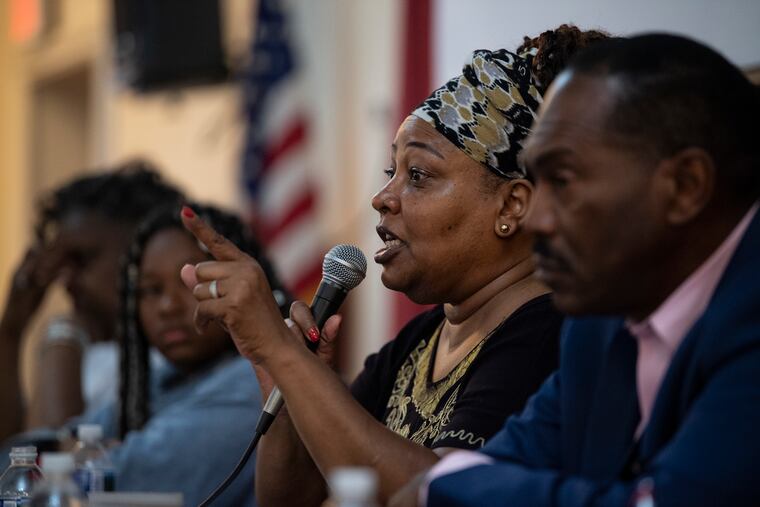'One small victory’: A community gathers after firings of Philadelphia police officers for offensive Facebook posts
Rally for Justice Coalition, community leaders and Philadelphia officials gathered to discuss the racist and offensive Facebook posts by nearly 330 police officers documented by the Plain View Project.

More than 100 city residents gathered Sunday for a town hall meeting, expressing continued concern over offensive Facebook posts made by hundreds of current and former Philadelphia police officers that were unearthed in June.
The town hall meeting at Mother Bethel African Methodist Episcopal Church in Society Hill was organized by the Rally for Justice Coalition — a group of black clergy members, NAACP members, and leaders of other activist organizations working with city officials on the issue of the Facebook posts. The forum gave Philadelphia residents a chance to hear updates on the situation and ask questions about what will happen next.
Earlier this month, Philadelphia Police Commissioner Richard Ross announced that 13 officers would be fired for making those posts. The Plain View Project compiled the posts and released them on June 1.
“After you get one small victory, like 13 police officers being fired, a lot of the time we raise our hands in victory and we’re ready to celebrate,” said Solomon Jones, the radio host and columnist who organized the initial protest outside the Philadelphia Police Headquarters shortly after the posts were made public in June. Jones is a member of the coalition.
“There are folks behind the scenes trying to get their jobs back, trying to get that progress reversed," Jones said. "We have to make sure the community is engaged and understands that every win we get is just part of a process.”
The town hall meeting, which was also attended by City Council President Darrell L. Clarke and members Curtis Jones Jr. and Helen Gym, began with a panel discussion by coalition members. It was moderated by Solomon Jones.
Coalition members have met with Mayor Jim Kenney and Ross, and plan to meet with them again in coming months. They are concerned about opposition to the firings by Fraternal Order of Police Lodge 5. At the time of the firings, the police union said it was preparing “an appropriate response to protect our members’ rights.”
“We are not done yet,” said Paula Peebles, state chairwoman of the National Action Network. “We want to take a look at their contract. We want to make certain that whatever’s in that contract reveals and reflects our feelings. At the end of the day, we pay their salary.”
Rochelle Bilal, who recently won the Democratic nomination for sheriff, thanked community members for showing up. She said such engagement empowers officers who “do good on and off duty in the city” to stand up against their colleagues who try to do wrong.
“I’ve been a cop for 27 years,” Bilal said. “There has not been one day where I have not spoken out about my colleagues who tried to do wrong as a cop. When I spoke up, they tried to come at me, but I reminded them that I was trained just like them.”
After the panelists spoke, attendees took turns sharing their opinions on what should be done to solve the problems that exist between the police and communities being policed. Suggestions included more community involvement in implicit bias training, the creation of a multicultural police union, regular drug testing of police officers and psychological exams every two years.
“It’s important for me to support this,” said Darien Shulur, who came with Rev. G. Lamar Stewart, the senior pastor at Taylor Memorial Baptist Church and a member of the coalition. “As a returning citizen and a black man myself, I understand what it means to be poorly policed.”
Jones said that although he appreciated the turnout at the town hall meeting, it’s important to remember that this is the beginning of a long process.
“This event was certainly a start,” he said. “It was said today that it took us a long time to get here. It’s not going to be instant that we get out of it. But we think that this was a good start in getting the community engaged in the process.”